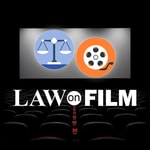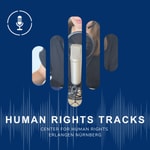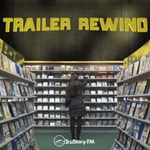Law on Film – Détails, épisodes et analyse
Détails du podcast
Informations techniques et générales issues du flux RSS du podcast.

Law on Film
Jonathan Hafetz
Fréquence : 1 épisode/18j. Total Éps: 48

Law on Film explores the rich connections between law and film. Law is critical to many films, even to those that are not obviously about the legal world. Film, meanwhile, tells us a lot about the law, especially how it is perceived and portrayed. The podcast is created and hosted by Jonathan Hafetz, a lawyer, legal scholar, and film buff. Each episode, Jonathan and a guest expert will examine a film that is noteworthy from a legal perspective. What does the film get right about the law and what does it get wrong? Why is law important to understanding the film? And what does the film teach about law's relationship to the larger society and culture that surrounds it. Whether you're interested in law, film, or an entertaining discussion, there will be something here for you.
Classements récents
Dernières positions dans les classements Apple Podcasts et Spotify.
Apple Podcasts
🇺🇸 États-Unis - filmHistory
31/07/2025#85🇺🇸 États-Unis - filmHistory
23/07/2025#85🇺🇸 États-Unis - filmHistory
22/07/2025#54🇺🇸 États-Unis - filmHistory
20/07/2025#74🇺🇸 États-Unis - filmHistory
24/06/2025#86🇨🇦 Canada - filmHistory
11/06/2025#95🇬🇧 Grande Bretagne - filmHistory
01/06/2025#92🇬🇧 Grande Bretagne - filmHistory
31/05/2025#75🇺🇸 États-Unis - filmHistory
31/05/2025#68🇬🇧 Grande Bretagne - filmHistory
30/05/2025#65
Spotify
Aucun classement récent disponible
Liens partagés entre épisodes et podcasts
Liens présents dans les descriptions d'épisodes et autres podcasts les utilisant également.
See allQualité et score du flux RSS
Évaluation technique de la qualité et de la structure du flux RSS.
See allScore global : 53%
Historique des publications
Répartition mensuelle des publications d'épisodes au fil des années.
Chinatown (1974) (Guest: John Walton) (episode 31)
mardi 10 septembre 2024 • Durée 47:00
Chinatown (1974) is a neo-noir crime thriller, directed by Roman Polanski from a screenplay by Robert Towne. Based loosely on the Owens Valley water wars in Los Angeles from the early twentieth century, the film follows private investigator J.J. (“Jake”) Gittes (Jack Nicholson) as he pursues a series of leads that take him into the dark underbelly of power and corruption in 1930s Los Angeles. A woman claiming to be "Evelyn Mulwray” initially hires Gittes to follow her husband Hollis, whom she suspects of infidelity. Gittes discovers that Noah Cross (John Huston), the father of the real Evelyn Mulwray (Faye Dunaway), had Hollis, his former business partner and head of the Los Angeles Department of Water and Power, killed. Hollis had learned of Cross’s plan to force famers in the Northwest valley to sell their land by cutting off their irrigating water and purchasing it through dummy syndicates on the cheap with the aim of developing the land into valuable Los Angeles real estate. Gittes also learns that the young woman he falsely suspected Hollis of having an affair with is Evelyn’s sister and daughter—the product of Evelyn’s rape by Cross when she was fifteen. While Gittes ultimately unravels the mystery, he is unable to stop the powerful Cross from achieving his goals or prevent the tragic fate that awaits Evelyn. My guest to talk about this venerated New Hollywood era classic is Emeritus Professor John Walton of the University of California, Davis.
Timestamps:
0:00 Introduction
3:37 Chinatown's historical and literary elements
6:28 How the film adapts historical events and figures
12:13 The private investigator in film and popular culture
18:09 Jake Gittes and the power structure
24:27 “Either you bring the water to LA, or you bring LA to the water”
28:17 The private eye and the police
32: 56 The mystery and impenetrability of power
35:00 How Chinatown affects perceptions of the water wars
38:43 Public law affecting water allocation and management
40:05 The formalities of law and the power structure beneath it
44:15 “The Defects of Total Power”
Further reading:
Brownstein, Ronald, “The 1970s Movie that Explains 2020s America,” The Atlantic (June 20, 2024)
Hoffman, Abraham, Vision or Villainy: Origins of the Owens Valley-Los Angeles Water Controversy (1981)
Kahrl, William L., “The Politics of the California Water: Owens Valley and the Los Angeles Aqueduct, 1900 – 1927,” Hastings West-Northwest J. Envt’l L. & Policy, vol. 6, nos. 1 & 2 (2000)
Libecap, Gary D., “Chinatown: Owens Valley and Western Water Reallocation – Getting the Record Straight and What It Means for Water Markets,” 83 Texas L. Rev. 2055 (2005)
Walton, John, “Film Mystery as Urban History: The Case of Chinatown,” Cinema and the City (M. Shiel & T. Fitzmaurice, 2001)
Walton, John, The Legendary Detective: The Private Eye in Fact and Fiction (U. Chicago Press (2015)
Law on Film is created and produced by Jonathan Hafetz. Jonathan is a professor at Seton Hall Law School. He has written many books and articles about the law. He has litigated important cases to protect civil liberties and human rights while working at the ACLU and other organizations. Jonathan is a huge film buff and has been watching, studying, and talking about movies for as long as he can remember.
For more information about Jonathan, here's a link to his bio: https://law.shu.edu/profiles/hafetzjo.html
You can contact him at jonathanhafetz@gmail.com
You can follow him on X (Twitter) @jonathanhafetz
You can follow the podcast on X (Twitter) @LawOnFilm
You can follow the podcast on Instagram @lawonfilmpodcast
The Verdict (1982) (Guest: John "Rusty" Wing) (episode 30)
mardi 6 août 2024 • Durée 01:11:47
The Verdict (1982) tells the story of down-on-his-luck Boston lawyer, Frank Galvin (Paul Newman). Galvin had been a rising star until he was framed for jury tampering by a partner at his elite Boston law firm because he planned to expose the firm's illegalities. Galvin left the firm and his marriage and career fell apart. After Galvin hits rock bottom, his former partner and friend Mickey Morrisey (Jack Warden) sends him a medical malpractice case as a favor; the case involves a botched delivery and is expected to settle out of court for a significant sum. But Galvin is moved after visiting the woman in the hospital, where he sees her in a comatose state. Galvin refuses the settlement offer and takes the case to trial, where he confronts the hospital’s high-powered and corrupt attorney Ed Concannon (James Mason) and a hostile judge (Milo O’Shea), Galvin also has a romantic relationship with another attorney, Laura Fischer (Charlotte Rampling) whom he meets in a bar but, unbeknownst to him, is a spy planted by Concannon. Galvin discovers the hospital is covering up its negligence. Although the judge excludes this evidence, Galvin wins a huge damage award as the jury sees the truth. The Verdict was directed by Sidney Lumet and written by David Mamet, adapted from Barry Reed’s 1980 novel of the same name. It is a gripping courtroom drama and a moving story of redemption. My guest is John (“Rusty”) Wing, Senior Counsel at Lankler, Siffert & Wohl, and a nationally recognized criminal defense attorney (full bio here)
Timestamps:
0.00 Introduction
3:23 A lawyer down on his luck
6:26 Jury-tampering
10:29 Rejecting a settlement offer without consulting the client
17:58 Why judges pressure settlement
26:53 Prepping the witness
32:05 The pretrial investigation
41:23 A mistrial?
44:09 The judge takes over the direct examination
47:46 A heated fight in chambers
49:57 The trial's pivotal moment
51:54 The judge’s evidentiary rulings
57:37 The summation
59:20 Jury nullification
106:23 A comparison with "12 Angry Men"
Further reading:
Bergman, Paul & Asimow, Reel Justice: The Courtroom Goes to the Movies (2006)
Mikulee, Sven, “‘The Verdict’: Sidney Lumet and David Mamet’s Masterpiece as a Blend of a Courtroom Drama and a Personal Redemption Story,” Cinephilia and Beyond
Parker, Richard D., “The Good Lawyer: The Verdict” in Screening Justice – The Cinema of Law: Significant Films of Law, Order and Social Justice (Rennard Strickland et. al. eds., 2006)
Souther, Sharon A., “The Artist’s Search for Justice in the Justice System: A Discussion of Representative Films of Sidney Lumet and Works from the World of Literature on the Law,” 25 Cardozo Arts & Ent. L.J. 687 (2007)
Valero, Geraldo, "Revisiting Sidney Lumet's The Verdict," RogerEbert.com (Aug. 15, 2023)
Law on Film is created and produced by Jonathan Hafetz. Jonathan is a professor at Seton Hall Law School. He has written many books and articles about the law. He has litigated important cases to protect civil liberties and human rights while working at the ACLU and other organizations. Jonathan is a huge film buff and has been watching, studying, and talking about movies for as long as he can remember.
For more information about Jonathan, here's a link to his bio: https://law.shu.edu/profiles/hafetzjo.html
You can contact him at jonathanhafetz@gmail.com
You can follow him on X (Twitter) @jonathanhafetz
You can follow the podcast on X (Twitter) @LawOnFilm
You can follow the podcast on Instagram @lawonfilmpodcast
Killers of the Flower Moon (Guest: Wilson Pipestem) (episode 21)
jeudi 29 février 2024 • Durée 01:01:17
Killers of the Flower Moon (2023) describes the series of murders of members of the Osage Nation in Oklahoma in the early 1920s. Because tribal members retained mineral rights on their reservation, they became extraordinarily wealthy after oil was discovered on tribal land. This leads a corrupt local boss, William K. Hale (Robert De Niro), to conspire with others in the community to deprive the Osage of their wealth by murdering them. Directed by Martin Scorsese and based on the 2017 book by David Grann, Killers of the Flower Moon focuses on the plot by Hale and his two nephews, Ernest Burkhart (Leonardo DiCaprio) and Byron Burkhart (Scott Shepherd), to take the oil rights of one Osage family. Hale's scheme is for Ernest to marry one of the sisters in the family, Mollie (Lily Gladstone), and then kill her other family members before finishing off Mollie herself so that Ernest can inherit Mollie's headrights. Eventually, federal agents come to Oklahoma to investigate the murders and uncover Hale’s plot, saving Molly and uncovering evidence to prosecute Hale and Ernest. But this is only after many Osage are murdered and their wealth stolen in a chilling story of violence, greed, and the racially motivated devastation of the Osage Tribe. I’m joined by Wilson Pipestem, a partner at Pipestem Law and citizen of the Otoe-Missouria Tribe and an Osage headright holder, who has dedicated his career to protecting the rights of tribal governments and American Indians.
Timestamps:
0:00 Introduction
4:26 The historical context and Osage tribal rights
14:35 The stereotype of rich Osages
15:25 Legal trusts and exploitation of the guardianship system
22:17 How limits on federal and tribal jurisdiction led to violence and impunity
26:30 Fear and terror in the Osage community
29:48 The federal investigation
32:06 The level of local complicity in the Osage murders
33:55 The treatment of the Osage as “incompetent” under the law
38:33 Capturing Osage tradition and belief on screen
41:27 Mollie and Ernest’s complex relationship
45:50 How the Osage overcame a legacy of violence and impunity
48:50 The role of law and lawyers
51:58 How Martin Scorsese listened to and engaged the Osage people
Further reading:
Bahr, Sarah, “What to Know About ‘Killers of the Flower Moon’: A Guide to the Osage Murders,” N.Y. Times (Oct. 23, 2023)
Blackhawk, Ned, The Rediscovery of America: American Indians and the Unmaking of U.S. History (2022)
Fletcher, Matthew L.M., “Failed Protectors: The Indian Trust and ‘Killers of the Flower Moon,’” 117 Mich. L. Rev. 1253 (2019)
Grann, David, Killers of the Flower Moon: The Osage Murders and the Birth of the FBI (2017)
Strickland, Rennard, “Osage Oil: Mineral Law, Murder, Mayhem, and Manipulation,” 10 Nat. Resources & Env’t. 39 (1995-96)
Law on Film is created and produced by Jonathan Hafetz. Jonathan is a professor at Seton Hall Law School. He has written many books and articles about the law. He has litigated important cases to protect civil liberties and human rights while working at the ACLU and other organizations. Jonathan is a huge film buff and has been watching, studying, and talking about movies for as long as he can remember.
For more information about Jonathan, here's a link to his bio: https://law.shu.edu/profiles/hafetzjo.html
You can contact him at jonathanhafetz@gmail.com
You can follow him on X (Twitter) @jonathanhafetz
You can follow the podcast on X (Twitter) @LawOnFilm
You can follow the podcast on Instagram @lawonfilmpodcast
Oppenheimer (Guest: Audra Wolfe) (episode 20)
mercredi 21 février 2024 • Durée 01:07:26
Oppenheimer (2023) stars Cillian Murphy as J. Robert Oppenheimer, the American theoretical physicist known as the “father of the atomic bomb” for his role as director of the Los Alamos Laboratory during World War II . The film was written and directed by Christopher Nolan, based on the book, American Prometheus by Kai Bird and Martin Sherwin. The film traces Oppenheimer’s early life, his rise to world prominence through the Manhattan Project, and his subsequent downfall after being stripped of his security clearance in 1954 due to his alleged past communist sympathies and outspoken criticism of the nuclear arms race. The cast includes Emily Blunt as Oppenheimer’s wife “Kitty”; Matt Damon as General Leslie Groves, the Manhattan Project's director; Robert Downey Jr. as Lewis Strauss, chair of the U.S. Atomic Energy Commission and rival of Oppenheimer; and Florence Pugh as Oppenheimer’s lover and former Communist party member, Jean Tatlock. The film provides a window not only into one of the 20th century’s most iconic figures, but also into the political and social forces that surrounded the birth of the Atomic Age and America’s transition from World War II to the Red Scare and Cold War. My guest is Audra Wolfe, a writer and historian who focuses on the role of science during the Cold War.
Timestamps:
0:00 Introduction
4:01 Reinvigorating debates about the bomb
7:48 Oppenheimer’s views in context
14:46 The factors driving the decision to drop the bomb
17:32 Was secrecy really required?
19:49 Science in Germany vs. the Soviet Union
24:14 FBI surveillance of Oppenheimer and other scientists
28:46 Revocation of Oppenheimer’s security clearance
37:37 Oppenheimer’s complicated legacy
41:09 Castle Bravo and nuclear testing: another seminar Cold War moment
45:01 Leslie Groves, Oppenheimer, and scientists with leftist affiliations
51:20 Vannevar Bush and other early Cold War science figures
53:45 Congress’s hearing on Lewis Strauss’ cabinet nomination
1:00:17 The film’s broader messages and lessons for today
1:04:37 Making nuclear weapons front and center
1:08:26 “Barbenheimer”
Further reading:
Bernstein, Barton, “The Oppenheimer Loyalty-Security Case Reconsidered”, 42 Stan. L. Rev. 1383 (1990)
Bird, Kai & Sherwin, Martin J., American Prometheus: The Triumph and Tragedy of J. Robert Oppenheimer (2005)
Curtis, Charles, The Oppenheimer Case: The Trial of a Security System (1955)
Sims, David, “‘Oppenheimer’ Is More Than a Creation Myth About the Atomic Bomb,” The Atlantic (July 19, 2023)
Wellerstein, Alex, Restricted Data: The History of Nuclear Secrecy in the United States (2021)
Wolfe, Audra J., Freedom's Laboratory: The Cold War Struggle for the Soul of Science (2020)
Law on Film is created and produced by Jonathan Hafetz. Jonathan is a professor at Seton Hall Law School. He has written many books and articles about the law. He has litigated important cases to protect civil liberties and human rights while working at the ACLU and other organizations. Jonathan is a huge film buff and has been watching, studying, and talking about movies for as long as he can remember.
For more information about Jonathan, here's a link to his bio: https://law.shu.edu/profiles/hafetzjo.html
You can contact him at jonathanhafetz@gmail.com
You can follow him on X (Twitter) @jonathanhafetz
You can follow the podcast on X (Twitter) @LawOnFilm
You can follow the podcast on Instagram @lawonfilmpodcast
Eye in the Sky (Guest: Craig Martin) (episode 19)
mercredi 7 février 2024 • Durée 01:06:52
Eye in the Sky (2015), directed by Gavin Hood from a script by Guy Hibbert, depicts the operation of a multinational team aimed at high-level operatives from the Al-Shabaab terrorist group in Nairobi, Kenya. When the British army learns of the location of the suspects, it plans to capture them. But surveillance reveals the suspects are preparing two new recruits to carry out a suicide bombing. British military officials, with their U.S. partner, seek to shift the operation from capture to kill. Officials must decide whether to authorize a lethal drone strike to avoid a possible terrorist attack, despite the possibility of civilian casualties, including of a young girl who is nearby. Eye in the Sky, which stars Helen Mirren, Aaron Paul, Barkhad Abdi, and Alan Rickman (in his last screen role), depicts the new reality of drone warfare and the complex legal and moral issues it raises. I’m joined by Craig Martin, Professor of Law at Washburn University School of Law and the creator and host of the JIB/JAB: The Laws of War Podcast (https://jibjabpodcast.com), which features top and upcoming experts in different aspects of the laws of war.
Timestamps:
0:00 Introduction
4:41 Background for the military operation
6:42. Does the law of armed conflict even apply?
13:14 A drone strike in a friendly country not at war
16:54 Why Kenya’s consent and involvement matters
19:10 Who is targetable under IHL?
26:31 Applying the jus in bello factors
30:42 The policy and strategic issues
34:40 "Revolutions are fueled by postings on YouTube"
36:52 The “Trolley Problem”
40:27 Is targeted killing a misnomer?
44:23 "Group Think” in drone operations
47:00 The impact of drone warfare on the participants
51:44 The role of lawyers
55:22 The “double tap” and the movie’s clear war crime
58:43 Other great movies about the laws of war
Further reading:
“‘Eye in the Sky’ film puts the use of drones in the spotlight,” PBS News Hour (Mar 18, 2016) (transcript)
Martin, Craig, “A Means-Methods Paradox and the Legality of Drone Strikes in Armed Conflict,” 19 Int’l J. Hum. Rights 142 (2015)
Melzer, Nils, Targeted Killing in International Law (Oxford Univ. Press 2009)
Milanovic, Marko, “Eye in the Sky,” EJIL: Talk (May 9, 2016)
Stimson Center, Recommendations and Report of the Task Force on U.S. Drone Policy (2d ed. Apr. 2015)
The White House, Remarks by the President at the National Defense University (May 23, 2013)
Law on Film is created and produced by Jonathan Hafetz. Jonathan is a professor at Seton Hall Law School. He has written many books and articles about the law. He has litigated important cases to protect civil liberties and human rights while working at the ACLU and other organizations. Jonathan is a huge film buff and has been watching, studying, and talking about movies for as long as he can remember.
For more information about Jonathan, here's a link to his bio: https://law.shu.edu/profiles/hafetzjo.html
You can contact him at jonathanhafetz@gmail.com
You can follow him on X (Twitter) @jonathanhafetz
You can follow the podcast on X (Twitter) @LawOnFilm
You can follow the podcast on Instagram @lawonfilmpodcast
Norma Rae (Guest: Fred B. Jacob) (episode 18)
mercredi 31 janvier 2024 • Durée 01:11:15
Norma Rae (1979) describes the struggle of Norma Rae Webster (Sally Field), a factory worker with limited education, to unionize a textile mill in North Carolina. The film was directed by Martin Ritt from a screenplay by Irving Ravetch and Harriet Frank Jr., and is based on the true story of Crystal Lee Sutton (as told in the 1975 book Crystal Lee, A Woman of Inheritance by New York Times reporter Henry P. Leifermann). Reuben Warshowsky (Ron Leibman), a union organizer from New York City, persuades Norma to help him organize a union. But Norma and Reuben must overcome a series of obstacles, including pressure and harassment from management as well as internal divisions among the textile workers. Norma, moreover, must navigate issues in her personal life, including with her new husband Sonny (Beau Bridges), who resents Norma’s growing commitment to the union. Ultimately, Norma succeeds as the workers vote to unionize. The film offers a snapshot of the labor movement on the cusp of the Reagan era in American and features a memorable, Oscar-winning performance by Sally Field in the title role. My guest is Fred B. Jacob, Solicitor of the National Labor Relations Board and labor law professor at George Washington University Law School. Fred’s views on this podcast are solely his own and not those of the National Labor Relations Board or the U.S. Government.
Timestamps:
0:00 Introduction
3:33 An inflection point in U.S. labor history
6:40 Unionizing the textile industry
13:29 The clash between culture and economics
14:03 Organizing a workplace
21:08 How unions are protected
24:17 A snapshot of the middle of the J.P. Stevens campaign
27:08 How the law operates in Norma Rae
28:38 Management’s pressure tactics
31:09 Why you need a “Norma Rae” when trying to organize people
32:46 The film’s iconic moment of worker power
35:30 Violence against the labor movement
40:17 Management’s exploitation of racial divisions
49:58 How the union helps empower Norma
53:57 What happened next at the factory
59:30 Crystal Lee Sutton: The real Norma Rae
1:01:36 Unions today
1:05:14 How the National Labor Relations Act helps people to be brave
1:08:51 Other great labor movies
Further reading:
Allan, Angela, “40 Years Ago, ‘Norma Rae’ Understood How Corporations Weaponized Race,” The Atlantic (Mar. 2, 2019)
Dray, Philip, There is Power in a Union (2011)
Dubofsky, Melvyn & McCartin, Joseph A., Labor in America: A History (9th ed. 2017)
Fry, Naomi, “The Ongoing Relevance of ‘Norma Rae,’” New Yorker (Aug. 4. 2020)
Kazek, Kelly, “When Hollywood came to Alabama to film 'Norma Rae,'” Al.com (May 3, 2019)
Leifermann, Henry P., Crystal Lee, A Woman of Inheritance (1975)
Law on Film is created and produced by Jonathan Hafetz. Jonathan is a professor at Seton Hall Law School. He has written many books and articles about the law. He has litigated important cases to protect civil liberties and human rights while working at the ACLU and other organizations. Jonathan is a huge film buff and has been watching, studying, and talking about movies for as long as he can remember.
For more information about Jonathan, here's a link to his bio: https://law.shu.edu/profiles/hafetzjo.html
You can contact him at jonathanhafetz@gmail.com
You can follow him on X (Twitter) @jonathanhafetz
You can follow the podcast on X (Twitter) @LawOnFilm
You can follow the podcast on Instagram @lawonfilmpodcast
A Civil Action (Guest: Jennifer Corinis) (episode 17)
mardi 16 janvier 2024 • Durée 01:10:46
A Civil Action (1998) is based on Jonathan Harr’s critically acclaimed book of the same name. Written and directed by Steve Zaillian, the film starts John Travolta, and features supporting performances by Robert Duvall (who was nominated for an Oscar), William H. Macy, James Gandolfini, John Lithgow, Kathleen Quinlan, and Tony Shalhoub. The film tells the true the story of the court battle over environmental pollution in Woburn, MA, in the 1970s and 1980s, where trichloroethylene (TCE), a solvent used in industrial operations, contaminated the local water supply, leading to numerous fatal cases of leukemia (including in small children) and other health problem for Woburn residents. Personal injury lawyer Jan Schlichtmann, brought suit on behalf of a group of victim families against two large corporations, Beatrice Foods and W.R. Grace, to hold them responsible for the pollution (a third company previously settled). But the suit ran into dogged resistance from large and powerful law firms on the other side, including WilmerHale (then Hale and Dorr) and one of its star litigators, Jerome ("Jerry") Facher (Robert Duvall). The film offers a dark view of the U.S. legal system's ability to uncover the truth and provide justice to victims. I'm joined by Jennifer (Jen) Corinis, an attorney at Greenberg Traurig, who has extensive experience litigating cases in the private sector and as an attorney for the U.S. government.
Timestamps:
0:00 Introduction
5:29 Can law remedy pain and suffering?
7:18 Who makes a "good" victim in a personal injury suit
13:04 Why Jan Schlichtmann takes up a case no one else wants
17:23 Litigating against large corporations
19:33 The different approaches of Schlichtmann and the legendary Jerry Facher
23:19 The Rule 11 motion
26:40 Bifurcating liability and damages
35:15 What might have motivated the jury
37:47 Proving contamination with scientific evidence and expert testimony
41:35 Schlictmann's problematic handling of a settlement offer
48:44 Anne Anderson and Woburn’s other advocates
56:53 Is a court the place to look for the truth?
1:02:07 Comparison with the big tobacco litigation
1:07:40 Subsequent litigation and later events
Further reading:
Blomquist, Robert F., “Bottomless Pit: Toxic Trials, the American Legal Profession, and Popular Perceptions of the Law,” 81 Cornell L. Rev. 953 (1996)
Chase, Anthony, “Civil Action Cinema,” 1999 L. Rev. Mich. St. U. Det. C.L. 945 (1999)
Harr, Jonathan, A Civil Action (1995)
Mayer, Dob, “Lessons in Law from ‘A Civil Action,’” 14 J. of Legal Studies Education 113 (1998)
Schlictmann, Jan R., “Law and the Environment: Reflections on Woburn,” 24 Seton Hall Legis. J. 265 (2000)
Law on Film is created and produced by Jonathan Hafetz. Jonathan is a professor at Seton Hall Law School. He has written many books and articles about the law. He has litigated important cases to protect civil liberties and human rights while working at the ACLU and other organizations. Jonathan is a huge film buff and has been watching, studying, and talking about movies for as long as he can remember.
For more information about Jonathan, here's a link to his bio: https://law.shu.edu/profiles/hafetzjo.html
You can contact him at jonathanhafetz@gmail.com
You can follow him on X (Twitter) @jonathanhafetz
You can follow the podcast on X (Twitter) @LawOnFilm
You can follow the podcast on Instagram @lawonfilmpodcast
Season One Wrap Up & Season Two Preview
mardi 19 décembre 2023 • Durée 02:29
Law on Film is created and produced by Jonathan Hafetz. Jonathan is a professor at Seton Hall Law School. He has written many books and articles about the law. He has litigated important cases to protect civil liberties and human rights while working at the ACLU and other organizations. Jonathan is a huge film buff and has been watching, studying, and talking about movies for as long as he can remember.
For more information about Jonathan, here's a link to his bio: https://law.shu.edu/profiles/hafetzjo.html
You can contact him at jonathanhafetz@gmail.com
You can follow him on X (Twitter) @jonathanhafetz
You can follow the podcast on X (Twitter) @LawOnFilm
You can follow the podcast on Instagram @lawonfilmpodcast
Indiana Jones Trilogy (Guest: Lucas Lixinski) (episode 16)
mardi 5 décembre 2023 • Durée 51:09
This episode explores the iconic Indiana Jones trilogy, some of the most popular and well-known movies of all time. The trilogy consists of the first three movies in the series: Raiders of the Lost Ark (1981); Indiana Jones and the Temple of Doom (1984); and Indiana Jones and the Last Crusade (1989). The films are based on a story by George Lucas and directed by Steven Spielberg. They feature archaeologist (and adventurer) Dr. Indiana Jones (Harrison Ford) as he travels across the world in the years before World War II to obtain valuable historical, cultural, and religious artifacts. The trilogy (and especially the first film, Raiders of the Lost Ark) is the cornerstone of the Indiana Jones franchise, which includes two additional films (Kingdom of the Crystal Skull (2008) and Dial of Destiny (2023)) as well as a TV series, video game, comic books, novels, theme parks, and toys. The films have inspired countless filmmakers and had a significant effect on cinema and popular culture. They also have important, if less discussed, legal dimensions. This episode examines the trilogy from the perspective of international heritage law (or cultural property law), the body of law centered around the preservation of property with historical, cultural, and/or religious significance. My guest is Lucas Lixinski, Professor at the Faculty of Law & Justice at the University of South Wales in Sydney, Australia.
Timestamps:
0:00 Introduction
4:19 Defining international heritage law (or cultural property law)
5:53 The pre-UNESCO and post-UNESCO periods
8:00 What the Indiana Jones films tell us about international heritage law
11:06 How Raiders of the Lost Ark frames the collection of artifacts
16:17 The fine line between looters and collectors
24:12 The questionable claim of saving cultural property from destruction
27:55 The power of Christian artifacts in Raiders and Last Crusade.
31:19 The problem of downplaying the importance of heritage
35:43 Why most items in museums can’t be viewed by the public
38:44 Temple of Doom and a different view of Indy
41:40 Indy’s interaction with non-western and indigenous populations
44:49 Indy's legacy for archaeology
46:53 A victor’s perspective?
49:29 Favorite Indiana Jones film?
Further reading:
Esterling, Shea, “Indiana Jones and the Illicit Trafficking and Repatriation of Cultural Objects,” in Courting the Media: Contemporary Perspectives on Media and the Law 127-48 (Nova 2011)
Killgrove, Kristina, “The Enduring Myths of ‘Raiders of the Lost Ark,’” The Smithsonian (June 8. 2021)
Lixinski, Lucas, “Moral, Legal and Archaeological Relics of the Past: Portrayals of International Cultural Heritage Law in Cinema,” 4(3) London Review of Int’l Law 421-37 (2016)
Nayman, Adam, “Digging Into the Cinematic Archaeology of the Indiana Jones Movies,” The Ringer (Jan. 7, 2019)
Smith, Laurajane, Use of Heritage (Routledge, 2007)
Law on Film is created and produced by Jonathan Hafetz. Jonathan is a professor at Seton Hall Law School. He has written many books and articles about the law. He has litigated important cases to protect civil liberties and human rights while working at the ACLU and other organizations. Jonathan is a huge film buff and has been watching, studying, and talking about movies for as long as he can remember.
For more information about Jonathan, here's a link to his bio: https://law.shu.edu/profiles/hafetzjo.html
You can contact him at jonathanhafetz@gmail.com
You can follow him on X (Twitter) @jonathanhafetz
You can follow the podcast on X (Twitter) @LawOnFilm
You can follow the podcast on Instagram @lawonfilmpodcast
Courted (L'Hermine) (France) (Guests: Fred Davis & Sam Bettwy) (episode 15)
mardi 21 novembre 2023 • Durée 56:18
Courted (French: L'Hermine), a 2015 French drama directed by Christian Vincent, is centered around a criminal trial in France. The accused, Martial Beclin (Victor Pontecorvo), is charged with manslaughter, which carries a possible twenty-year prison sentence, for allegedly kicking his seven-month-old daughter to death. The trial is conducted in France’s cour d’assises, which hears more serious crimes. The president and senior judge, Michel Racine (Fabrice Luchini), runs a tight ship. Courted offers valuable insights into judges, jurors, and criminal procedure in France, and provides a vehicle to compare criminal trials there to those in the United States. The film also contains a romantic sub-plot that traces Judge Racine’s relationship with one of the jurors and an old friend, Ditte Lorensen-Coteret (played by the Danish actress, Sidse Babett Knudsen). My guests to discuss Courted and comparative criminal justice in films are Fred Davis, an international lawyer and Lecturer in Law at Columbia Law School, and Sam Bettwy, an Adjunct Professor at the University of San Diego Law School and the Thomas Jefferson School of Law.
Timestamps:
0:00 Introduction
5:55 Comparing criminal justice through film
10:57 Learning from another country’s criminal justice system
13:56 The cour d’assises and jury trials in France
18:32 The European Court of Human Rights’ ruling in Taxquet v. Belgium
20:06 Comparing the French and U.S. criminal justice systems through film
25:56 The judge’s role in France
30:00 Compiling the dossier in French criminal investigations
35:20 How other countries view the right against self-incrimination
40:27 Juries in the French system
45:34 Who the hero is at trial and what it signifies
50:28 Appealing an acquittal in France
52:57 Fulfilling one’s role in the system
Further Reading:
Bettwy, Samuel W., Comparative Criminal Procedure Through Film: Analytical Tools & Law and Film Summaries by Legal Tradition and Country (2015)
Donovan, James W., Juries and the Transformation of Criminal Justice in France in the Nineteenth and Twentieth Centuries (2010)
Kirry, Antoine, Davis, Frederick T. & Bisch, Alexander, “France,” in The International Investigations Review (Nicolas Bourtin ed.) (10th ed. 2020)
Prot, Bénédicte, “L'Hermine, a gentle film,” Cineuropa, https://cineuropa.org/en/newsdetail/298323/
Robert, Philippe, “The French Criminal Justice System,” in Punishment in Europe: A Critical Anatomy of Penal Systems (Vincenzo Ruggerio et al. eds) (2013)
Law on Film is created and produced by Jonathan Hafetz. Jonathan is a professor at Seton Hall Law School. He has written many books and articles about the law. He has litigated important cases to protect civil liberties and human rights while working at the ACLU and other organizations. Jonathan is a huge film buff and has been watching, studying, and talking about movies for as long as he can remember.
For more information about Jonathan, here's a link to his bio: https://law.shu.edu/profiles/hafetzjo.html
You can contact him at jonathanhafetz@gmail.com
You can follow him on X (Twitter) @jonathanhafetz
You can follow the podcast on X (Twitter) @LawOnFilm
You can follow the podcast on Instagram @lawonfilmpodcast




